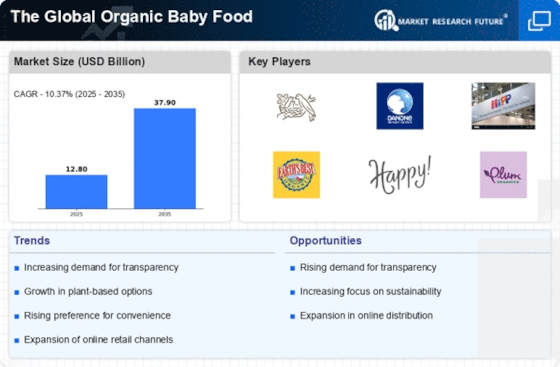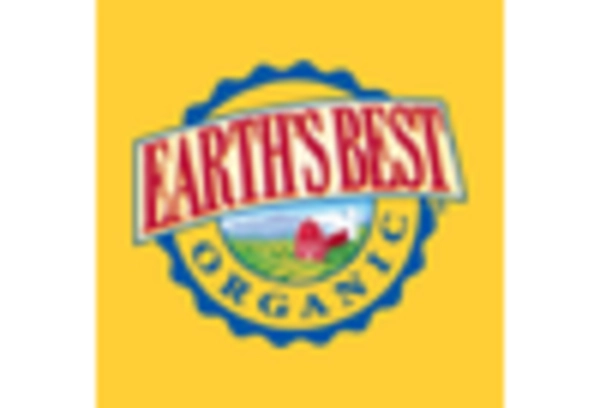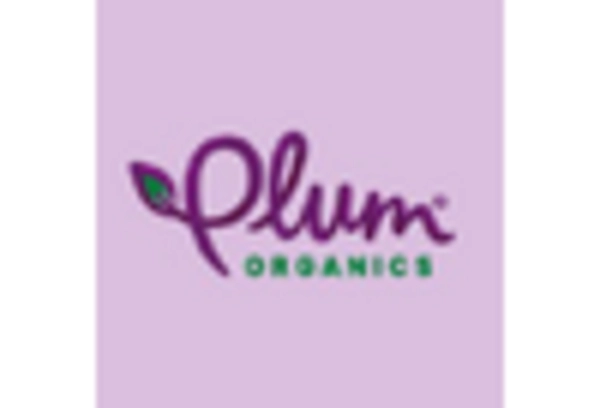-
Executive Summary
-
Market Introduction
-
Definition 21
-
Scope of the Study 21
-
Assumptions 22
-
Market Structure 22
-
Key Takeaways 23
-
Key Buying Criteria 23
-
Research Methodology
-
Research Process 25
-
Primary Research 26
-
Secondary Research 27
-
Market Size Estimation 27
-
Forecast Model 28
-
Market Dynamics
-
Introduction 30
-
Drivers 30
- Increasing demand for convenience food 30
- Climate change and need of sustainable agriculture 32
- Easier raw material availability and efficiency in production 32
- Rising demand of organic products 32
- Trend of food traceability 33
- Drivers Impact Analysis 33
-
Restraints 34
- Higher price of organic baby food 34
- Lack of awareness about organic baby food 34
- Low shelf life of organic baby food 34
- Restraints Impact Analysis 35
-
Opportunities 35
- Huge investments in R&D and new product developments 35
- Government initiatives and funding to support the farmers 35
- Increasing demand of clean label products 36
-
Challenges 36
- Huge capital investments and certifications 36
-
Mega Trends 37
- Import & Export Scenario 37
-
Innovation in application and process 38
-
Market Factor Analysis
-
Value Chain Analysis 43
-
Supply Chain Analysis 44
-
Porter’s Five Forces Analysis 45
- Threat of New Entrants 45
- Threat of Substitutes 46
- Bargaining Power of Buyers 46
- Bargaining Power of Suppliers 47
- Intensity of Rivalry 47
-
Organic Baby Food Market, By Product Type
-
Overview 49
- Ready to eat 49
- Milk Formula 49
- Dried Baby Food 49
- Others 49
-
Organic Baby Food Market, By Ingredients
-
Overview 55
- Grains & Cereals 55
- Dairy 55
- Vegetables 55
- Fruits 55
- Others 55
-
Organic Baby Food Market, By Distribution Channel
-
Overview 62
- Store Based 62
- Non-store Based 62
-
Global Organic Baby Food Market, By Region
-
Introduction 66
-
North America 67
-
Organic Baby Food Market, By Product Type
-
Organic Baby Food Market, By Ingredients
-
Organic Baby Food Market, By Distribution Channel
-
North America Organic Baby Food Market, By Country 67
-
Organic Baby Food Market, By Product Type
-
Organic Baby Food Market, By Ingredients
-
Organic Baby Food Market, By Distribution Channel
-
North America Organic Baby Food Market, By Product Type 68
-
Organic Baby Food Market, By Product Type
-
Organic Baby Food Market, By Ingredients
-
Organic Baby Food Market, By Distribution Channel
-
North America Organic Baby Food Market, By Ingredients Type 69
-
Organic Baby Food Market, By Product Type
-
Organic Baby Food Market, By Ingredients
-
Organic Baby Food Market, By Distribution Channel
-
North America Organic Baby Food Market, By Distribution Channel 71
-
Organic Baby Food Market, By Product Type
-
Organic Baby Food Market, By Ingredients
-
Organic Baby Food Market, By Distribution Channel
-
U.S. 72
-
Organic Baby Food Market, By Product Type
-
Organic Baby Food Market, By Ingredients
-
Organic Baby Food Market, By Distribution Channel
-
Canada 75
-
Organic Baby Food Market, By Product Type
-
Organic Baby Food Market, By Ingredients
-
Organic Baby Food Market, By Distribution Channel
-
Mexico 78
-
Organic Baby Food Market, By Product Type
-
Organic Baby Food Market, By Ingredients
-
Organic Baby Food Market, By Distribution Channel
-
Europe 81
-
Organic Baby Food Market, By Product Type
-
Organic Baby Food Market, By Ingredients
-
Organic Baby Food Market, By Distribution Channel
-
Europe Organic Baby Food Market, By Country 81
-
Organic Baby Food Market, By Product Type
-
Organic Baby Food Market, By Ingredients
-
Organic Baby Food Market, By Distribution Channel
-
Europe Organic Baby Food Market, By Product Type 83
-
Organic Baby Food Market, By Product Type
-
Organic Baby Food Market, By Ingredients
-
Organic Baby Food Market, By Distribution Channel
-
Europe Organic Baby Food Market, By Ingredients Type 84
-
Organic Baby Food Market, By Product Type
-
Organic Baby Food Market, By Ingredients
-
Organic Baby Food Market, By Distribution Channel
-
Europe Organic Baby Food Market, By Distribution Channel 85
-
Organic Baby Food Market, By Product Type
-
Organic Baby Food Market, By Ingredients
-
Organic Baby Food Market, By Distribution Channel
-
U.K 86
-
Organic Baby Food Market, By Product Type
-
Organic Baby Food Market, By Ingredients
-
Organic Baby Food Market, By Distribution Channel
-
Germany 89
-
Organic Baby Food Market, By Product Type
-
Organic Baby Food Market, By Ingredients
-
Organic Baby Food Market, By Distribution Channel
-
France 92
-
Organic Baby Food Market, By Product Type
-
Organic Baby Food Market, By Ingredients
-
Organic Baby Food Market, By Distribution Channel
-
Italy 95
-
Organic Baby Food Market, By Product Type
-
Organic Baby Food Market, By Ingredients
-
Organic Baby Food Market, By Distribution Channel
-
Spain 99
-
Organic Baby Food Market, By Product Type
-
Organic Baby Food Market, By Ingredients
-
Organic Baby Food Market, By Distribution Channel
-
Russia 102
-
Organic Baby Food Market, By Product Type
-
Organic Baby Food Market, By Ingredients
-
Organic Baby Food Market, By Distribution Channel
-
Rest of Europe 105
-
Organic Baby Food Market, By Product Type
-
Organic Baby Food Market, By Ingredients
-
Organic Baby Food Market, By Distribution Channel
-
Asia-Pacific 108
-
Organic Baby Food Market, By Product Type
-
Organic Baby Food Market, By Ingredients
-
Organic Baby Food Market, By Distribution Channel
-
Asia-Pacific Organic Baby Food Market, By Country 108
-
Organic Baby Food Market, By Product Type
-
Organic Baby Food Market, By Ingredients
-
Organic Baby Food Market, By Distribution Channel
-
Asia-Pacific Organic Baby Food Market, By Product Type 109
-
Organic Baby Food Market, By Product Type
-
Organic Baby Food Market, By Ingredients
-
Organic Baby Food Market, By Distribution Channel
-
Asia-Pacific Organic Baby Food Market, By Ingredients Type 110
-
Organic Baby Food Market, By Product Type
-
Organic Baby Food Market, By Ingredients
-
Organic Baby Food Market, By Distribution Channel
-
Asia-Pacific Organic Baby Food Market, By Distribution Channel 111
-
Organic Baby Food Market, By Product Type
-
Organic Baby Food Market, By Ingredients
-
Organic Baby Food Market, By Distribution Channel
-
China 112
-
Organic Baby Food Market, By Product Type
-
Organic Baby Food Market, By Ingredients
-
Organic Baby Food Market, By Distribution Channel
-
India 116
-
Organic Baby Food Market, By Product Type
-
Organic Baby Food Market, By Ingredients
-
Organic Baby Food Market, By Distribution Channel
-
Japan 119
-
Organic Baby Food Market, By Product Type
-
Organic Baby Food Market, By Ingredients
-
Organic Baby Food Market, By Distribution Channel
-
Australia 122
-
Organic Baby Food Market, By Product Type
-
Organic Baby Food Market, By Ingredients
-
Organic Baby Food Market, By Distribution Channel
-
New Zealand 126
-
Organic Baby Food Market, By Product Type
-
Organic Baby Food Market, By Ingredients
-
Organic Baby Food Market, By Distribution Channel
-
Indonesia 129
-
Organic Baby Food Market, By Product Type
-
Organic Baby Food Market, By Ingredients
-
Organic Baby Food Market, By Distribution Channel
-
Rest of APAC 132
-
Organic Baby Food Market, By Product Type
-
Organic Baby Food Market, By Ingredients
-
Organic Baby Food Market, By Distribution Channel
-
Latin America 135
-
Organic Baby Food Market, By Product Type
-
Organic Baby Food Market, By Ingredients
-
Organic Baby Food Market, By Distribution Channel
-
Latin America Organic Baby Food Market, By Country 135
-
Organic Baby Food Market, By Product Type
-
Organic Baby Food Market, By Ingredients
-
Organic Baby Food Market, By Distribution Channel
-
Latin America Organic Baby Food Market, By Product Type 136
-
Organic Baby Food Market, By Product Type
-
Organic Baby Food Market, By Ingredients
-
Organic Baby Food Market, By Distribution Channel
-
Latin America Organic Baby Food Market, By Ingredients Type 137
-
Organic Baby Food Market, By Product Type
-
Organic Baby Food Market, By Ingredients
-
Organic Baby Food Market, By Distribution Channel
-
Latin America Organic Baby Food Market, By Distribution Channel 139
-
Organic Baby Food Market, By Product Type
-
Organic Baby Food Market, By Ingredients
-
Organic Baby Food Market, By Distribution Channel
-
Brazil 140
-
Organic Baby Food Market, By Product Type
-
Organic Baby Food Market, By Ingredients
-
Organic Baby Food Market, By Distribution Channel
-
Argentina 143
-
Organic Baby Food Market, By Product Type
-
Organic Baby Food Market, By Ingredients
-
Organic Baby Food Market, By Distribution Channel
-
Rest of Latin America 146
-
Organic Baby Food Market, By Product Type
-
Organic Baby Food Market, By Ingredients
-
Organic Baby Food Market, By Distribution Channel
-
Middle East & Africa 149
-
Organic Baby Food Market, By Product Type
-
Organic Baby Food Market, By Ingredients
-
Organic Baby Food Market, By Distribution Channel
-
Middle East & Africa Organic Baby Food Market, By Country 149
-
Organic Baby Food Market, By Product Type
-
Organic Baby Food Market, By Ingredients
-
Organic Baby Food Market, By Distribution Channel
-
Middle East & Africa Organic Baby Food Market, By Product Type 150
-
Organic Baby Food Market, By Product Type
-
Organic Baby Food Market, By Ingredients
-
Organic Baby Food Market, By Distribution Channel
-
Middle East & Africa Organic Baby Food Market, By Ingredients Type 151
-
Organic Baby Food Market, By Product Type
-
Organic Baby Food Market, By Ingredients
-
Organic Baby Food Market, By Distribution Channel
-
Middle East & Africa Organic Baby Food Market, By Distribution Channel 152
-
Organic Baby Food Market, By Product Type
-
Organic Baby Food Market, By Ingredients
-
Organic Baby Food Market, By Distribution Channel
-
Middle East 153
-
Organic Baby Food Market, By Product Type
-
Organic Baby Food Market, By Ingredients
-
Organic Baby Food Market, By Distribution Channel
-
Africa 157
-
Organic Baby Food Market, By Product Type
-
Organic Baby Food Market, By Ingredients
-
Organic Baby Food Market, By Distribution Channel
-
Competitive Landscape
-
Introduction 162
-
Company Profiles
-
Danone SA 166
- Overview 166
- Company Snapshot 166
- Product Portfolio 167
- Business Strategies 167
- Key Developments 167
- SWOT Analysis 168
-
Hero Group 169
- Overview 169
- Company Snapshot 169
- HERO GROUP Product Portfolio 170
- Business Strategies 170
- Key Developments 170
- SWOT Analysis 171
-
Abbott Laboratories 172
- Overview 172
- Company Snapshot 172
- Product Portfolio 173
- Business Strategies 173
- Key Developments 173
- SWOT Analysis 174
-
Kraft Heinz Foods 175
- Overview 175
- Company Snapshot 175
- Business Strategies 175
- Key Developments 176
-
Nestle S.A. 177
- Overview 177
- Company Snapshot 177
- Business Strategies 177
- Key Developments 178
- SWOT Analysis 178
-
Hain Celestial Group 179
- Overview 179
- Company Snapshot 179
- Product Portfolio 180
- Business Strategies 180
- Key Developments 180
-
Bellamy’s Australia 181
- Overview 181
- Company Snapshot 181
- Business Strategies 181
- Key Developments 181
-
Plum Inc. 182
- Overview 182
- Company Snapshot 182
- Product Portfolio 182










Leave a Comment